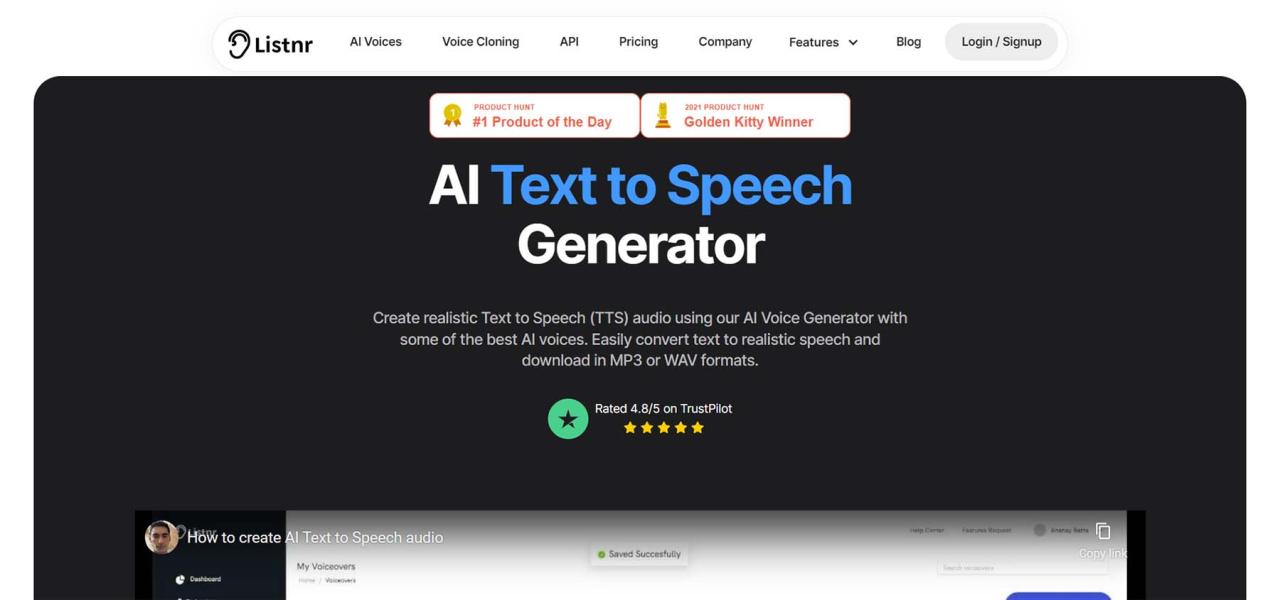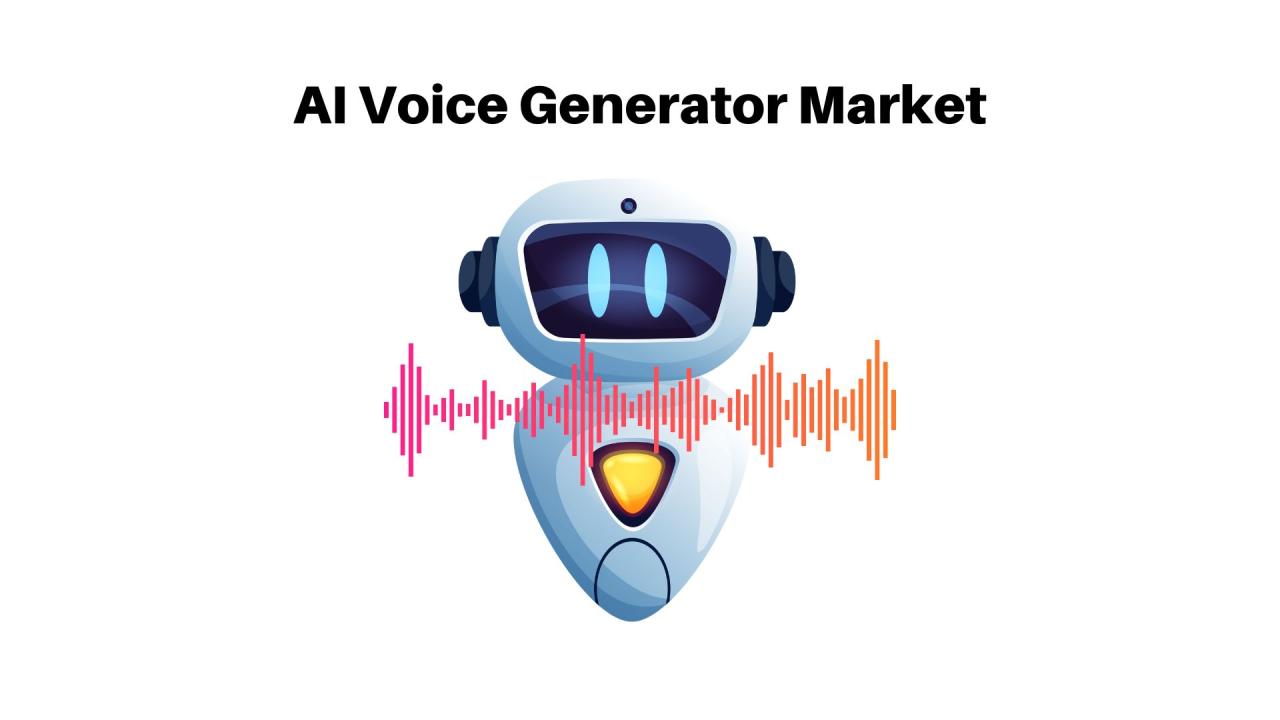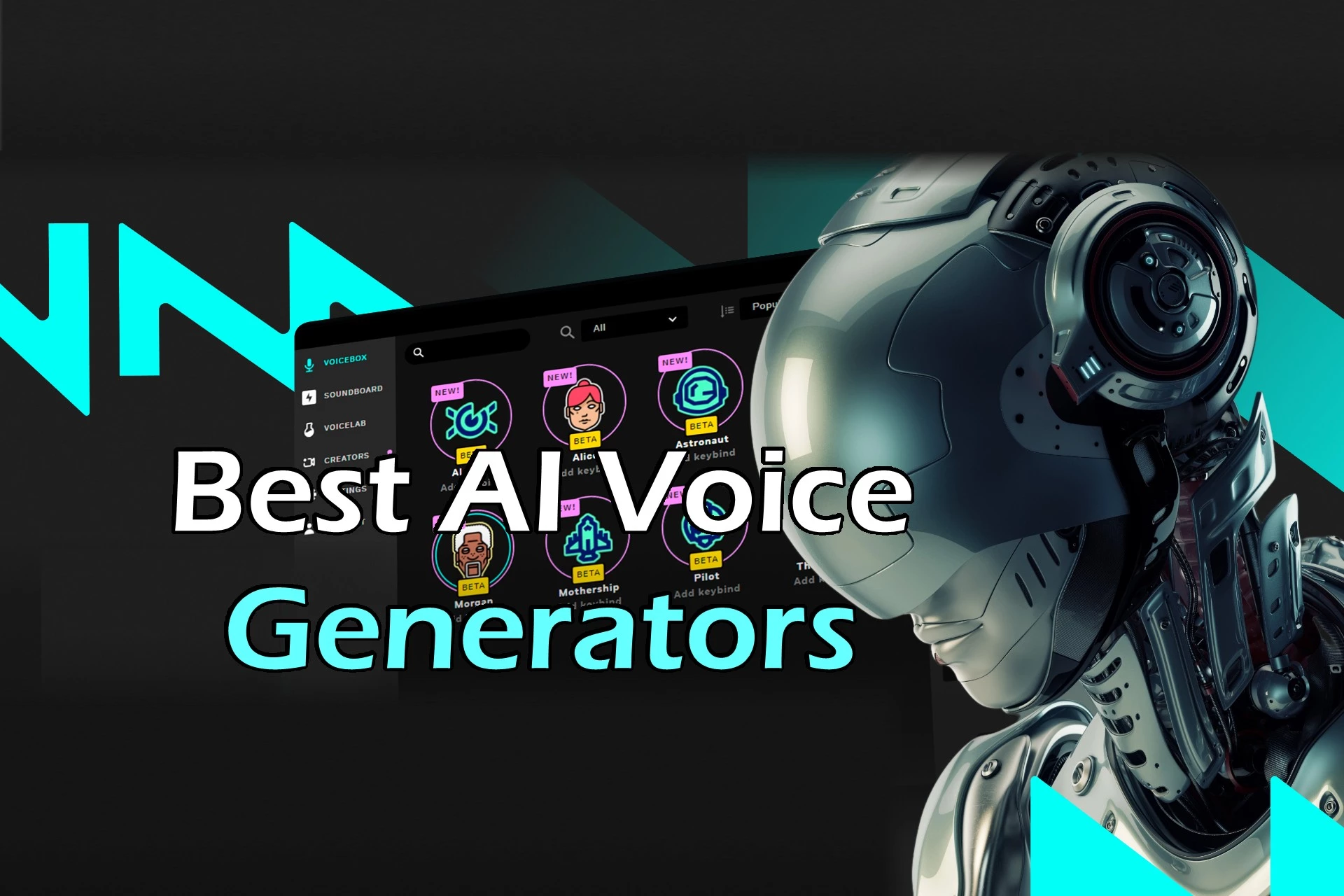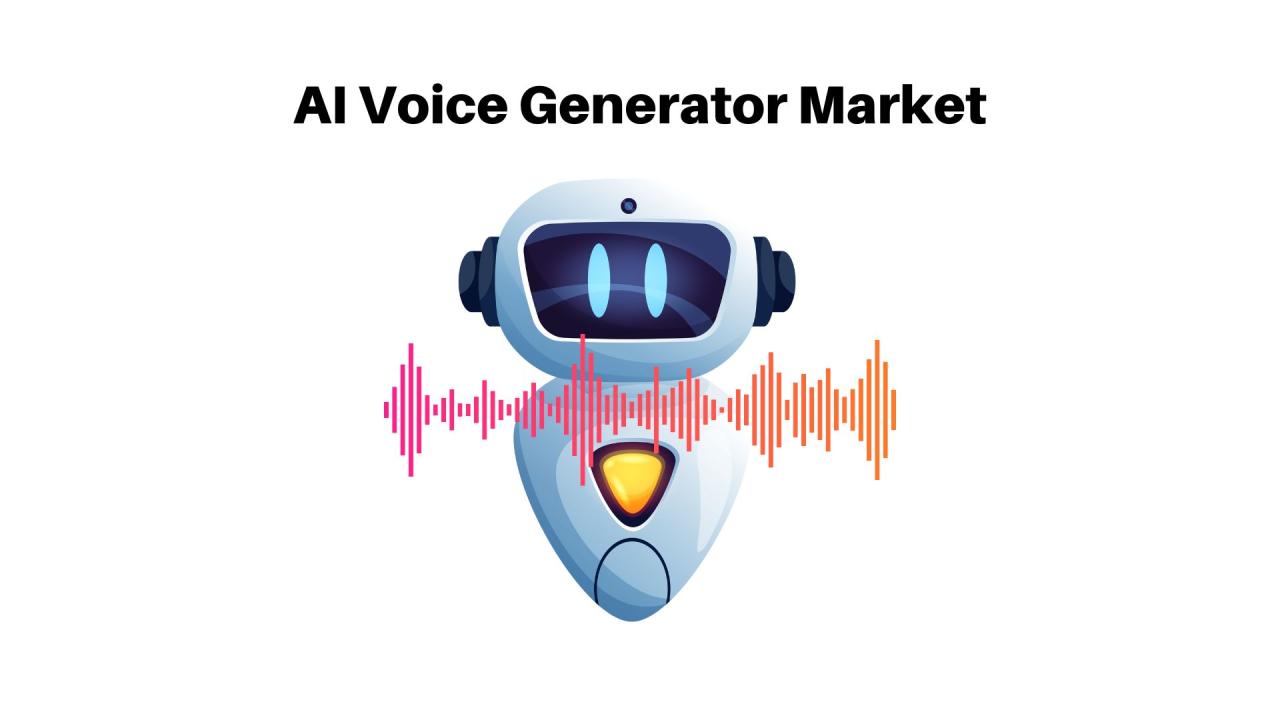Comparing different AI voice generator software options is more than just picking a program; it’s about finding the perfect voice for your project. This guide dives into the exciting world of AI voice generation, exploring the key features, customization options, and integration capabilities of several leading software packages. We’ll help you navigate the complexities of pricing models, audio quality, and platform compatibility to make an informed decision.
From the naturalness of speech to the ease of use and the range of voice styles and accents available, we’ll compare and contrast the strengths and weaknesses of each software. We’ll also delve into the technical specifications, licensing considerations, and ethical implications of using AI-generated voices. Whether you’re creating audiobooks, e-learning materials, or video game soundtracks, this guide provides a comprehensive overview to help you choose the best AI voice generator for your needs.
AI Voice Generator Software: A Comprehensive Comparison: Comparing Different AI Voice Generator Software Options

The market for AI voice generator software is booming, offering a wide array of options for various applications. This comparison explores several popular choices, examining their features, capabilities, and suitability for different needs. We’ll delve into voice quality, customization options, ease of use, and integration capabilities, providing a detailed overview to help you choose the best software for your project.
Choosing the right AI voice generator can be tricky! You need to weigh factors like naturalness and cost. For example, while you’re comparing options, check out this hockey news: Canucks recall Arturs Silovs, Thatcher Demko remains out vs – a quick break from the tech! Then, get back to evaluating those AI voices based on your specific project needs.
Remember to listen to demos before committing.
Introduction to AI Voice Generator Software

AI voice generators leverage sophisticated algorithms to create realistic human-like speech from text input. The market is diverse, ranging from simple text-to-speech tools to advanced platforms offering extensive customization and voice cloning. Key features commonly found include a selection of voices (with various accents and styles), control over parameters like speed and pitch, and export options for different audio formats.
AI-generated voices find applications in diverse fields, such as e-learning (creating audio versions of textbooks), audiobooks, video game development, voice assistants, and accessibility tools for visually impaired users.
Comparing Key Features Across Different Software

We will compare three popular AI voice generators: Murf.ai, ElevenLabs, and Amazon Polly. Each offers unique strengths and weaknesses in terms of naturalness, customization, and user experience.
Regarding naturalness, Murf.ai generally receives high marks for producing clear and expressive speech, while ElevenLabs excels in its ability to create highly realistic and nuanced voices. Amazon Polly, while functional, might exhibit a slightly less natural tone in certain contexts. Murf.ai and ElevenLabs offer robust customization options, including the ability to fine-tune parameters and even clone voices. Amazon Polly provides a more limited set of customization features.
Murf.ai boasts a user-friendly interface with intuitive controls, while ElevenLabs’ interface, though powerful, might have a steeper learning curve for beginners. Amazon Polly offers a straightforward interface suitable for quick tasks.
Picking the right AI voice generator can be tricky! You need to consider factors like naturalness and cost. To get a better understanding of how these choices impact the final product, think about the level of polish needed – it’s kind of like wondering what happened to Wayne Mardle as commentator, missing from What happened to Wayne Mardle as commentator missing from – a significant absence changes the whole experience.
Ultimately, your decision on AI voice software depends on your specific project needs.
| Software Name | Pricing Model | Key Features | Pros/Cons |
|---|---|---|---|
| Murf.ai | Subscription, Free Trial | Various voices, customization options, easy interface | Pros: User-friendly, high-quality voices. Cons: Can be expensive for extensive use. |
| ElevenLabs | Pay-per-use, Subscription | Highly realistic voices, voice cloning, advanced customization | Pros: Exceptional voice quality and realism. Cons: Steeper learning curve, potentially more expensive depending on usage. |
| Amazon Polly | Pay-per-use | Wide range of languages and voices, simple interface | Pros: Cost-effective for small projects, many language options. Cons: Less natural sounding than others, limited customization. |
Voice Quality and Customization
Each software provides a distinct set of voice styles and accents. Murf.ai offers a broad selection catering to various demographics and tones. ElevenLabs stands out with its focus on realism, providing voices that closely mimic human speech patterns. Amazon Polly offers a wide range of languages but may have fewer stylistic options within each language. Voice cloning capabilities vary significantly.
ElevenLabs is known for its advanced cloning features, allowing users to create voices based on audio samples. Murf.ai offers some degree of customization but doesn’t have the same level of cloning capabilities. Amazon Polly does not offer voice cloning. Control over intonation, pitch, and speed is generally good across all three, though ElevenLabs allows for finer-grained adjustments.
Murf.ai and ElevenLabs generally offer higher bitrates and sample rates resulting in higher audio quality compared to Amazon Polly. The exact specifications vary depending on the chosen voice and settings.
Integration and Accessibility, Comparing different AI voice generator software options
Platform compatibility varies. Murf.ai, ElevenLabs, and Amazon Polly all offer web-based interfaces. API integrations are available for Murf.ai and ElevenLabs, allowing for seamless integration into various applications. Amazon Polly also provides extensive API support. All three offer text-to-speech options and support multiple languages, contributing to their accessibility.
- Murf.ai: Pros: Good API integration, multiple platform support. Cons: Limited offline functionality.
- ElevenLabs: Pros: Robust API, strong focus on realism. Cons: Can be more complex to integrate.
- Amazon Polly: Pros: Extensive API documentation, wide language support. Cons: Fewer customization options via API.
Use Cases and Examples

These software options find diverse applications. Murf.ai is suitable for creating e-learning materials, marketing videos, and podcasts. ElevenLabs is ideal for video game voice acting, audiobook narration, and creating highly realistic virtual assistants. Amazon Polly is well-suited for applications requiring a wide range of languages and cost-effectiveness, such as automated announcements and accessibility tools.
For instance, Murf.ai could be used to create engaging e-learning modules with a variety of voices and tones, while ElevenLabs could be employed to generate realistic dialogue for a video game character. Amazon Polly could be utilized for creating multilingual announcements for a public transportation system.
| Software Name | Supported Formats | File Size Comparison | Quality Comparison |
|---|---|---|---|
| Murf.ai | MP3, WAV, etc. | Varies depending on settings, generally medium to large file sizes for high quality. | High quality, clear and expressive. |
| ElevenLabs | MP3, WAV, etc. | Varies, generally medium to large file sizes for high quality. | Very high quality, highly realistic. |
| Amazon Polly | MP3, WAV, etc. | Generally smaller file sizes compared to Murf.ai and ElevenLabs. | Good quality, but less natural compared to others. |
Technical Specifications and Performance
System requirements vary slightly among the three. Generally, a modern processor, sufficient RAM, and adequate storage are required for optimal performance. Processing speed and rendering time depend on factors like voice selection, audio length, and system resources. All three software options handle various workloads effectively, although performance might decrease with very long audio files or complex settings.
Each utilizes proprietary audio processing techniques to optimize speech synthesis and enhance naturalness.
Licensing and Legal Considerations
Licensing agreements and terms of service vary. It’s crucial to review each software’s specific terms to understand any restrictions on commercial use or potential limitations. Ethical considerations include responsible use, avoiding the creation of misleading or harmful content, and respecting intellectual property rights when using voice cloning features.
- Murf.ai: Check their website for specific licensing details. Commercial use usually requires a paid subscription.
- ElevenLabs: Refer to their terms of service for details on commercial use and any limitations.
- Amazon Polly: Amazon’s terms of service govern the use of their service. Commercial use is generally permitted within the framework of their pricing model.
Last Point
Ultimately, selecting the right AI voice generator software depends on your specific needs and priorities. This comparison has highlighted the diverse landscape of options available, each with its own unique strengths and weaknesses regarding voice quality, customization, integration, and licensing. By carefully considering the factors discussed, you can confidently choose the software that best aligns with your project’s requirements and budget, ensuring your AI-generated voice achieves the desired impact and professional quality.
Picking the right AI voice generator can be tricky – you’ve got so many options! Before you dive in, though, remember that focusing on a career path is important too. Check out the surgical tech program admission requirements and prerequisites if that’s something you’re considering, as it might influence your choice of voice generator for creating study materials or presentations.
Then, once you’ve got your bearings, you can get back to comparing those AI voices!
Helpful Answers
What are the ethical considerations of using AI-generated voices?
Ethical concerns include potential misuse for scams or impersonation, copyright issues regarding voice cloning, and the impact on voice actors’ livelihoods.
How much storage space do these programs typically require?
Storage requirements vary widely depending on the software and the number of voices and audio files stored. Check the system requirements of each program for specifics.
Can I use these AI voices for commercial purposes?
Commercial use is generally allowed, but licensing agreements vary. Always check the terms of service for each software to understand the restrictions.
What file formats are commonly supported?
Commonly supported formats include MP3, WAV, and sometimes others like AAC or WMA. Check the specifications for each program.
